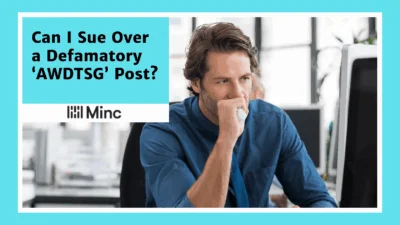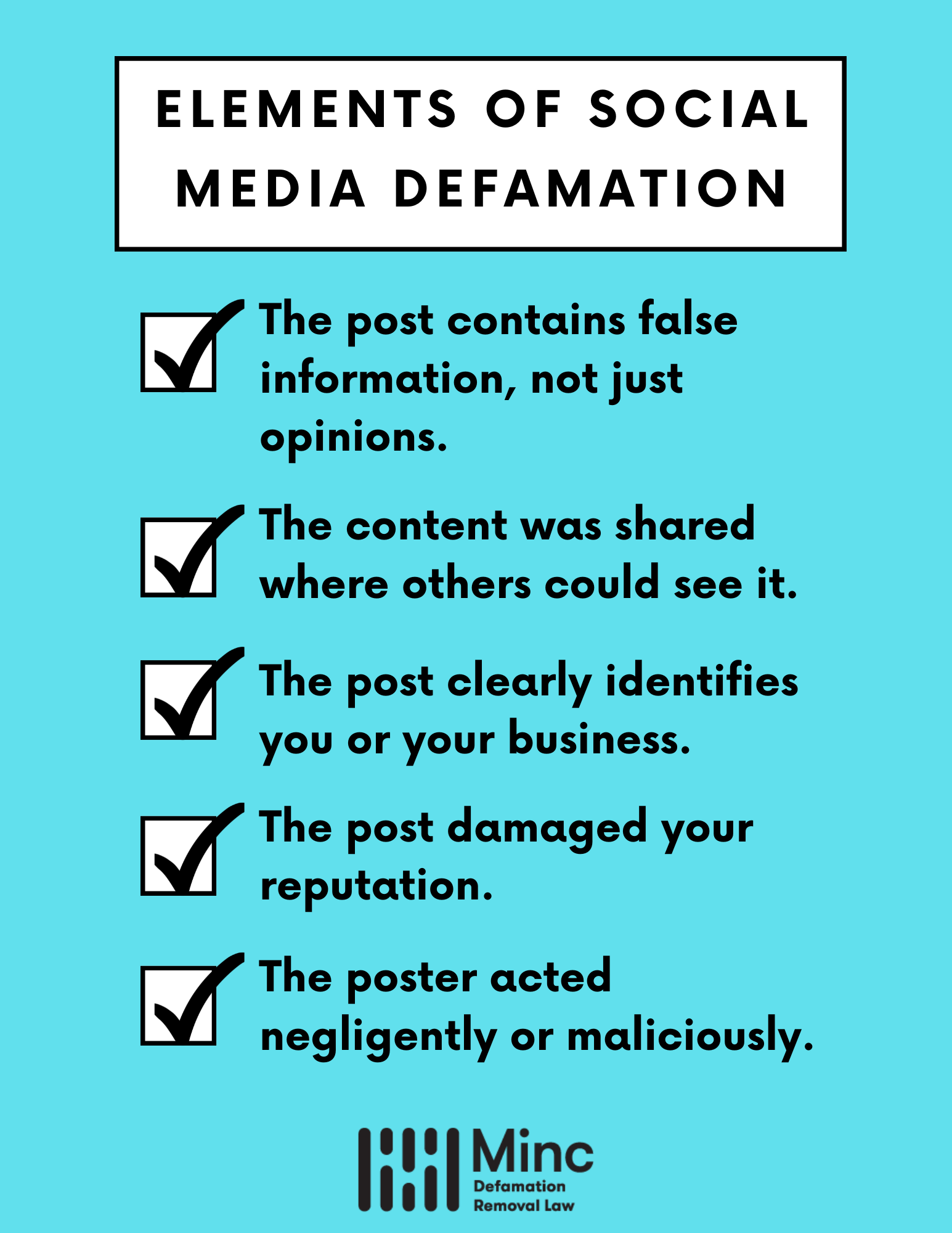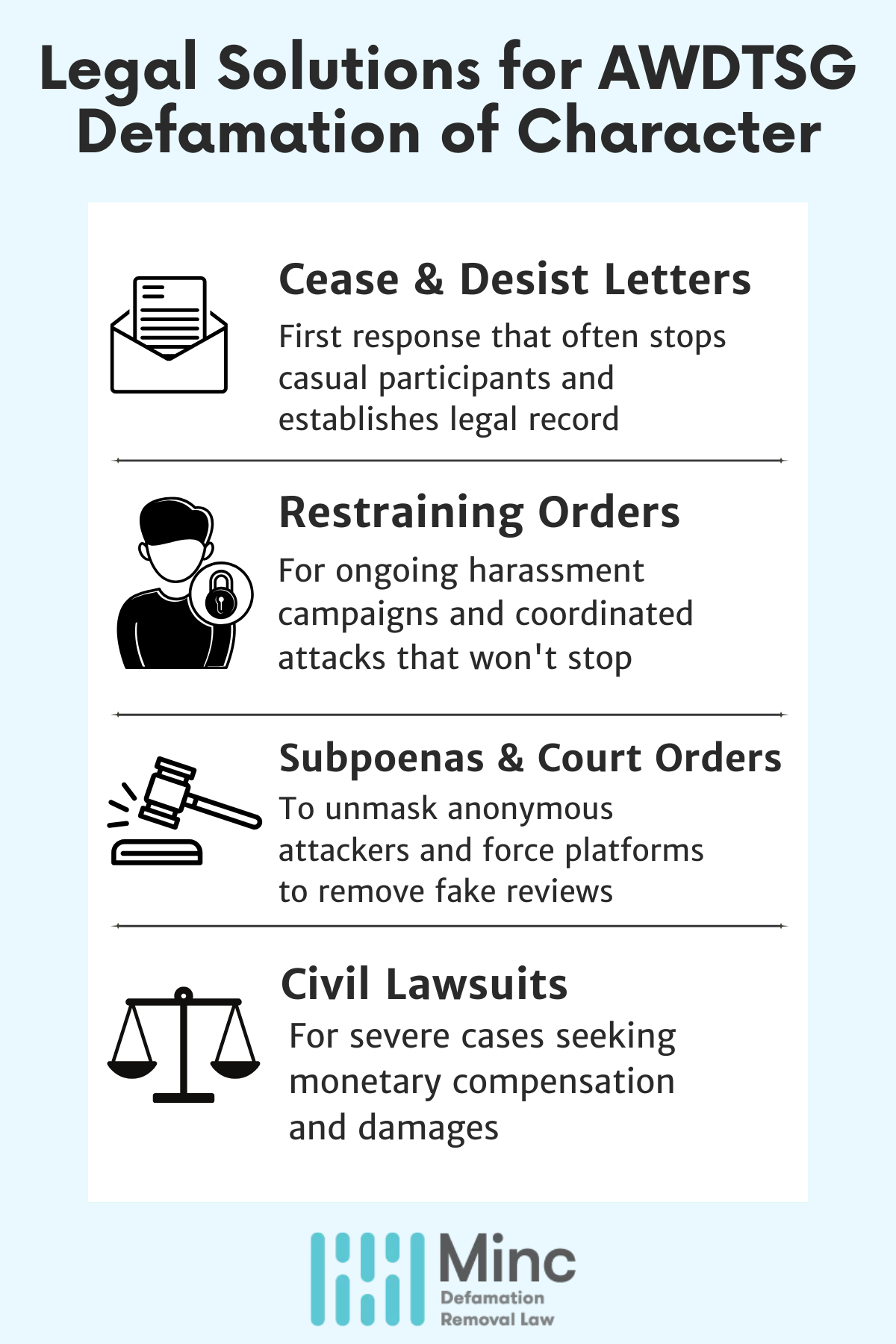
- Originally Published on August 4, 2025
Can I Sue for Defamation Over an Are We Dating the Same Guy Post?
Discovering that someone has posted about you in an “Are We Dating the Same Guy” Facebook group can be shocking and devastating. These private groups, which exist in cities across the country, allow women to share information about men they have dated. While the groups claim to promote safety, they have become platforms where false accusations and damaging rumors can spread to thousands of people without your knowledge or consent.
If you have found yourself targeted in one of these groups, you may feel helpless and violated. The private nature of these communities means you probably cannot see what has been said about you or defend yourself against false claims. However, you are not without legal recourse.
At Minc Law, we have deep experience in online defamation cases and have helped thousands of clients address false and damaging content on social media platforms. We understand the unique challenges these groups present and can help you explore your legal options for fighting back against defamatory posts.
Important Note:
Minc Law focuses on cases involving significant reputational or financial harm caused by false statements of fact. We are not able to assist with matters based on true statements, minor disputes, or situations without measurable impact. Legal fees apply, and we do not work on a contingency basis.
The Legal Reality: Yes, You Can Sue for AWDTSG Defamation
The simple answer is yes, you can potentially sue for defamation over posts in “Are We Dating the Same Guy” groups. However, success depends on whether the content meets specific legal requirements for defamation claims.
To understand your legal options, it helps to know what defamation actually means in legal terms. Defamation is not just any negative comment or criticism about you. Instead, it refers to a very specific type of harmful communication that the law recognizes as crossing the line from protected speech into actionable wrongdoing.
For content to qualify as defamation, it must meet four key requirements:
1. The statement must be false – True statements, no matter how embarrassing or damaging, are not defamatory. The law protects people’s right to share truthful information, even when that truth is unflattering. However, if someone posts false claims about your behavior, character, or actions, this element is satisfied.
2. The statement must be presented as fact, not opinion – Saying “I think John is a jerk” is protected opinion. But claiming “John stole money from me” or “John cheated on his girlfriend with three different women” presents specific factual claims that can be proven true or false.
3. The statement must be published to third parties – This means the false information was shared with other people, not just communicated privately between you and the poster. AWDTSG posts easily meet this requirement since they are shared with thousands of group members.
4. The statement must cause reputational harm – You must be able to show that the false statements actually damaged how others perceive you. This could include lost job opportunities, damaged relationships, social ostracism, or other tangible consequences.
Additionally, you must prove that the person making the statement acted with at least negligence. For private individuals like most people targeted in AWDTSG posts, this means the poster should have known better or failed to verify their claims before posting. This is a much lower standard than what public figures must meet.

How AWDTSG Groups Actually Work
Understanding the mechanics of these groups is crucial for building a legal case. AWDTSG groups operate as private Facebook communities where women share photos and stories about men they have dated. The groups exist in major cities nationwide and can have memberships ranging from hundreds to tens of thousands of people.
The Posting Process
Typical posts include your photograph along with descriptions of dating experiences or warnings about your behavior. Posts are reviewed by moderators before publication, but this review focuses on formatting and group rules rather than fact-checking. The moderators do not verify the accuracy of claims made about you.
Posters often remain anonymous or use fake names, while your identifying information, including photos, name, and sometimes workplace or other personal details, is shared with the entire group membership. You have no opportunity to respond, clarify, or defend yourself against false accusations.
The Amplification Effect
Once posted, content can spread rapidly through comments, shares, and screenshots. Other group members may add their own unverified claims or experiences, creating a snowball effect where false information gains credibility through repetition. The content often migrates beyond Facebook to other social media platforms, text messages, and word-of-mouth conversations.
Types of Posts That Cross Into Defamation Territory
While not every negative post constitutes defamation, certain categories of content clearly violate legal boundaries and can form the basis for successful lawsuits.
Criminal Allegations
False accusations of criminal behavior represent some of the most serious forms of defamation. Claims that you committed sexual assault, domestic violence, theft, stalking, or other crimes when these allegations are untrue can devastate your reputation and may also violate criminal defamation laws in some states.
Professional and Financial Claims
Posts that falsely claim you engage in unethical business practices, have been fired for misconduct, are financially irresponsible, or make other false statements about your professional life can result in quantifiable damages. These types of posts can directly impact your ability to earn a living and maintain professional relationships.
Health and Personal Life Falsehoods
False claims about sexually transmitted infections, mental health issues, drug or alcohol abuse, or other personal matters can severely damage your reputation and relationships. Even when these topics are sensitive, false statements about them can still constitute defamation.
Relationship and Character Attacks
While opinions about your personality are generally protected, false factual claims about your behavior in relationships can be defamatory. This includes false accusations of cheating, emotional abuse, financial manipulation, or other specific behaviors that did not occur.
The Unique Challenges of AWDTSG Defamation Cases
Pursuing defamation claims related to AWDTSG posts involves several distinctive challenges that differ from traditional defamation cases.
Platform Immunity Issues
Section 230 of the Communications Decency Act protects Facebook from liability for user-generated content. This means you cannot sue Facebook or Meta for hosting defamatory posts about you. Your legal recourse is limited to pursuing the individual who made the post, which can significantly impact the practical value of your case if that person lacks substantial assets.
Anonymous Poster Problems
Many AWDTSG posts are made by users with limited identifying information or fake profiles. While legal discovery can potentially unmask anonymous posters through subpoenas for IP addresses and account information, this process is time-consuming, expensive, and not always successful.
Evidence Preservation Difficulties
Since you likely cannot access the private groups where posts about you appear, preserving evidence requires assistance from others who can screenshot content before it disappears. Social media evidence is ephemeral and can be deleted without warning, making quick action essential.
Proving Damages
Successful defamation cases require proof of actual harm to your reputation. This can include lost job opportunities, damaged business relationships, social ostracism, or other tangible consequences. Documenting these damages requires careful record-keeping and may involve gathering testimony from others.
Your Legal Options and Strategic Approaches
If you have been targeted in an AWDTSG group, you have several potential legal strategies available, depending on your specific circumstances and goals.
Immediate Evidence Preservation
Your first priority should be documenting all available evidence before it disappears. Work with trusted contacts who can access the groups to capture comprehensive screenshots of posts, comments, user profiles, timestamps, and any other relevant information. This evidence forms the foundation of any potential legal action.
Platform-Based Removal Efforts
Facebook has community standards that prohibit harassment and false information. While getting posts removed through standard reporting mechanisms can be challenging, experienced attorneys often achieve better results by crafting removal requests that cite specific policy violations and present evidence in compelling formats.
Direct Communication with Posters
Cease and desist letters can be effective tools for stopping defamatory posts and securing retractions. These formal legal notices demand that the poster immediately stop making false statements about you and may request public corrections. Many cases resolve at this stage because defendants prefer to avoid the costs and exposure of litigation.
Lawsuits & Court Orders
When other approaches fail or when the defamation is particularly severe, formal litigation may be necessary. Successful defamation lawsuits can result in monetary damages for reputational harm, court orders requiring content removal, and injunctions preventing future defamatory statements.
When posters remain anonymous, “John Doe” lawsuits can compel platforms and internet service providers to reveal identifying information. This process involves filing a lawsuit against an unknown defendant and then using court orders to obtain the information needed to identify them.

Practical Considerations Before Taking Legal Action
Before pursuing legal action, consider several practical factors that can affect the success and value of your case.
Cost-Benefit Analysis
Legal costs for defamation cases typically range from $300 to $500 per hour for attorney fees, plus additional costs for court filings, discovery, and expert witnesses. Consider whether the potential recovery and other benefits justify these expenses.
Defendant’s Financial Resources
Even if you win a defamation lawsuit, collecting damages requires that the defendant have assets or income to satisfy the judgment. If the poster has limited financial resources, your primary benefit may be injunctive relief requiring content removal rather than monetary compensation.
Streisand Effect Concerns
Legal action can sometimes draw additional attention to defamatory content. Consider whether pursuing a lawsuit might amplify the very harm you are trying to address. Experienced attorneys can help you evaluate this risk and develop strategies to minimize unwanted publicity.
Time Limitations
Defamation statutes of limitations vary by state but typically range from one to three years from the publication date. Acting quickly preserves your legal options and prevents evidence from disappearing.
Working with Experienced Legal Counsel
AWDTSG defamation cases involve unique challenges that require specialized knowledge and experience. Working with attorneys who understand online defamation law and social media platforms can significantly improve your chances of success.
Case Evaluation and Strategy Development
An experienced defamation attorney can quickly evaluate whether your situation meets the legal requirements for a defamation claim and assess the strength of your potential case. They can also help you develop a comprehensive strategy that may include multiple approaches depending on your specific goals and circumstances.
Platform Knowledge and Relationships
Attorneys who regularly handle social media defamation cases understand platform policies, removal procedures, and the most effective ways to communicate with platform representatives. This knowledge can be crucial for achieving content removal through non-litigation approaches.
Discovery and Investigation
Identifying anonymous posters and gathering evidence in online defamation cases requires knowledge of legal discovery procedures. Experienced attorneys have the tools necessary to unmask anonymous defendants and preserve crucial evidence.
How Minc Law Can Help You Fight Back
At Minc Law, we have dedicated our practice to helping victims of online defamation and reputation attacks. We understand the unique challenges posed by platforms like AWDTSG groups and have developed proven strategies for achieving content removal, identifying anonymous posters, and holding defamers accountable.
Our approach combines aggressive legal advocacy with practical reputation management strategies. We work closely with clients to understand their specific goals and develop customized strategies that address both immediate concerns and long-term reputation protection.
We also understand the emotional toll of being targeted with false information online. Our team provides compassionate support throughout the legal process, helping clients not just resolve their legal issues but also regain confidence and peace of mind.
Every case is unique, and we tailor our approach to your specific situation and objectives. Whether you need emergency content removal, want to identify an anonymous poster, or are considering pursuing damages for the harm you have suffered, we can help you understand your options and develop an effective strategy.
Contact Minc Law for a free case evaluation today by calling (216) 373-7706 or by completing our online contact form below.
Get Your Free Case Review
Fill out the form below, and our team will review your information to discuss the best options for your situation.
This page has been peer-reviewed, fact-checked, and edited by qualified attorneys to ensure substantive accuracy and coverage.



